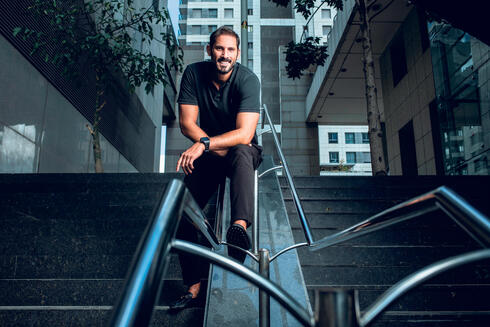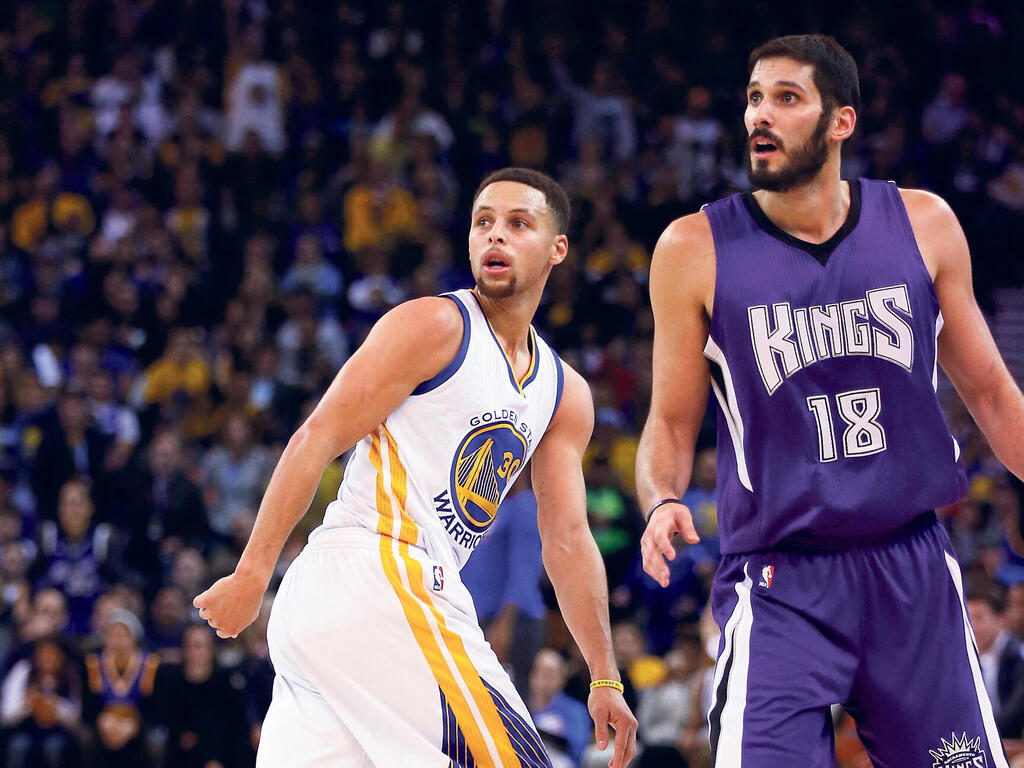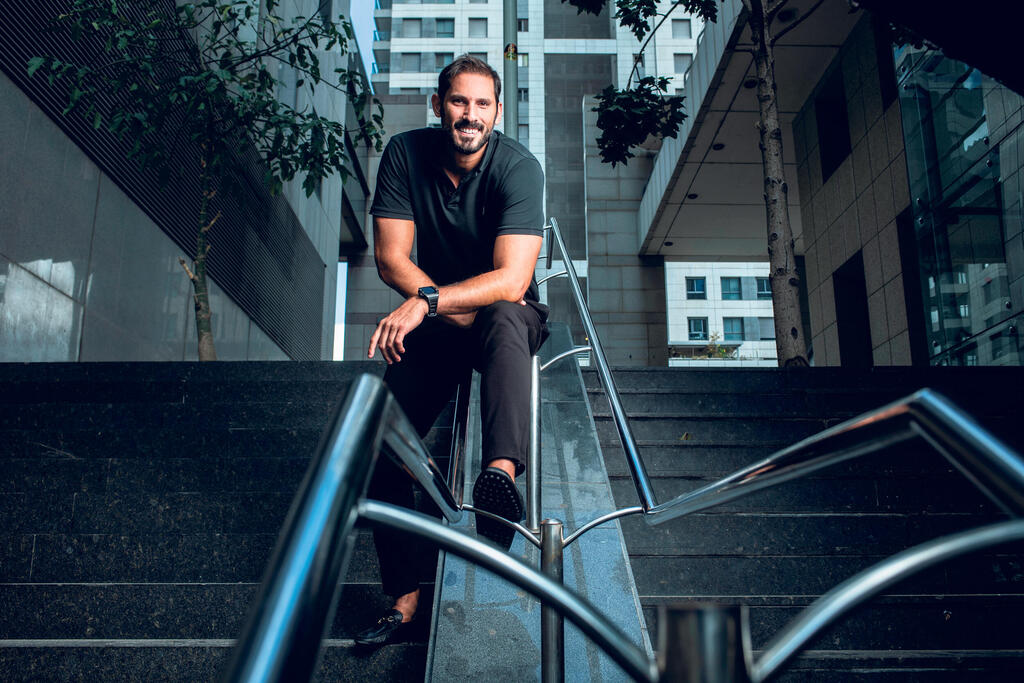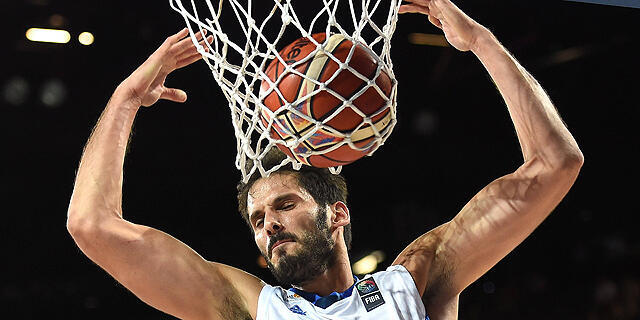
"In the NBA, I shared a locker room with LeBron and Steph, in high-tech, I'm like a baby learning to crawl"
Three years after retiring from basketball, Omri Casspi is trying to build a name for himself in the venture capital industry: "I get questions from entrepreneurs like, 'What do you know about high-tech?' In the end, you’re only as good as your last game."
Omri Casspi hasn’t attended a basketball game in three and a half years. Not as a player, and not even as a spectator. He avoids even stepping onto the court with its shiny parquet floor to avoid the temptation. Since retiring in the summer of 2021, Casspi, the first Israeli ever to play in the NBA, has decided to reinvent himself. For that transformation to succeed—and for him to be taken seriously in the venture capital world he’s now part of—he felt the need to distance himself entirely from his glamorous basketball past. Now, two and a half years after raising his first fund, Sheva (Hebrew for 7, his jersey number when he played for Maccabi Tel Aviv), and just before closing his second fund, Swish, Casspi is ready to return to the spotlight, speaking in an exclusive interview with Calcalist.
Many raised their eyebrows when Casspi (36) first appeared in high-tech circles. His tall, athletic frame stood out among the scrawny graduates of Israel's elite technology units zipping around on scooters in Tel Aviv. At first, some assumed his involvement in venture capital was a gimmick—an attempt to leverage the connections he made during his NBA career to make some noise. After all, even while playing, he dabbled in startup investments, including Marius Nacht's DayTwo, which recently shut down. But the once-snobbish, closed-off ecosystem of high-tech has started to shift its attitude towards Casspi. More and more people are acknowledging that Casspi is a serious investor, a diligent student who already knows how to navigate the various subfields of cyber. One of Israel's top names in the market remarked, "Casspi speaks fluent Cyber."
Beyond the knowledge he’s gained, what stands out most is his humility and diligence—traits not often seen in stars who dabble in high-tech for a brief tour. During his basketball career, many who played with Casspi noted that he wasn’t just talented—he was hardworking, always giving his all on the court, until injuries in his later years sidelined him.
Now, Casspi is trying to bring that same passion to his new world, cutting ties with the game he loved and to which he devoted most of his life. He meets with entrepreneurs, venture capital partners, and institutional investors. And even though he stands 2.06 meters tall (6’7”) and by 20 was already earning millions, with names like LeBron James, Kevin Durant, and Steph Curry just a WhatsApp message away, he doesn’t look down on anyone.
Even for this interview, it was important to him that I speak with the people he’s learned from during his short high-tech career to validate that he’s not just another celebrity tourist in the field. This is the first time Casspi has spoken about his new venture capital career, and like some of his portfolio companies, he’s been careful to stay under the radar until now.
Aren’t you exaggerating? Why haven’t you gone to a game? Is it that you don’t have time, or are you afraid it would pull you back into the image of a basketball star dabbling in high-tech?
"Anything that would distract me from my focus right now won’t happen. Only when I feel comfortable with myself will I go see a game," Casspi replies sharply.
Do you already feel comfortable in your new career?
"Right now, I’d say I’m leading in the second quarter of the game. I haven’t won yet, but I’d rather be ahead than behind. That’s how I see things for myself and my investors," Casspi says, unable to fully let go of basketball terminology. Throughout the interview, he refers to the entrepreneurs he’s invested in as "my brothers," a term rarely used in the more formal venture capital world.
Casspi’s first fund, Sheva, raised $36 million in 2022, most of which has already been invested. On paper, it has generated a fourfold return and is ranked in the top ten in the Cambridge Associates ranking for venture capital funds. As someone who earned an estimated $25 million during his NBA career, Casspi also contributed some of his own money to the fund. Naturally, as a fund just over two years old, there haven’t been any exits yet, but Casspi has secured access to some of the hottest Israeli companies in software and cyber.
The crown jewel of his portfolio, responsible for much of the fund's returns, is Eon, which last week emerged from stealth and is drawing comparisons to Assaf Rappaport's Wiz. Eon was founded by Ofir Ehrlich, who sold CloudEndure to Amazon for $200 million five years ago. Together with Gonen Stein and Ron Kimchi, Ehrlich launched Eon at the beginning of 2024 to develop cloud data backup solutions. Despite remaining under the radar, the company has raised over $100 million in its nine months of existence, with its latest fundraising valuing the company at $750 million. Major Silicon Valley players like Sequoia and Lightspeed participated, and Casspi’s fund was there from the Seed round.
Another notable investment is cyber company Upwind, where Casspi even brought in his friend Steph Curry from his Golden State Warriors days. Curry, a role model for Casspi not just in basketball but also in investing, is an investor in the Penny Jar fund, which invested in promising Israeli cyber company Zafran.
"I haven’t sold a company yet, nor closed one, but I’m confident I have companies worth billions," Casspi says, momentarily abandoning the modesty he’s projected throughout the conversation and dipping back into his NBA lexicon: "I have several outliers already."
"It's important not to lose your head"
Did you think about "the day after" even before you retired? It's not trivial, especially considering the alarming statistic that 75% of NBA players become completely bankrupt within five years of retirement because they risked their money without fully understanding what they were doing.
"Yes, that was indeed the scary statistic when I entered the NBA in 2009, and I experienced it myself when, at the age of 21, I arrived in the U.S. and earned half a million dollars. Suddenly, you're famous, playing in big games, and appearing on TV. It's very important to protect your home life and relationships. You mustn’t lose your head along the way. I thought about it a lot," Casspi admits, "but today, the situation is a little better because the league has recognized the problem and is investing in financial education, including preparatory lectures for retirement. You're made to realize that even if you're the best player in the world, sitting around the court in San Francisco are people like Elon Musk, Mark Zuckerberg, and Sergey Brin. They have much more money than you and they pay your salary. You're also taught to respect everyone—the people who bought tickets to the game and even the waiter at the café. Little by little, you gain knowledge. Today, players like Curry and Durant have become amazing finance people, building intergenerational wealth.
"Even so, the situation is still not perfect. On the one hand, you don’t want to become a cautionary tale of a basketball player who invested and lost everything. People might say, ‘What do you know about high-tech? What does CSPM (Cloud Security Posture Management) have to do with you? Write a $50,000 check and we'll see.’ Fast forward to today, my biggest challenge is proving myself. I’ve put my head down and haven’t attended a single Maccabi game because I have to build a reputation. That’s the basketball mentality—you're only as good as your last game."
How did you start thinking about venture capital? Real estate, for example, seems simpler and more accessible.
"I had this idea in my head in one way or another, but it became more serious when I played for Golden State in San Francisco in 2018. I saw friends like Steph Curry, LeBron James, and Kevin Durant building investments—one in venture capital, another in media, and another in a family office. I started getting to know San Francisco’s business community and decided that ‘when I grow up,’ I wanted to do it full-time. I also got to know people in Israel. One of my friends, Alon Lifshitz, a partner at the Hanaco Venture Capital fund, sat down with me for lunch. A week later, he called and said, ‘I think you should start your own venture capital fund, not join others.’ I said, ‘Are you crazy? What are you talking about? I don’t even know where to start.’"
Why didn’t you join an existing fund? It seems easier and would allow you to learn the field.
"Because I didn’t really have any offers. It’s not easy to take someone from basketball and expect them to be good at investments—many players have been less successful in this field. You have to prove yourself," Casspi admits. "Over the past year, I’ve received many offers from both Israeli and foreign funds, but for now, I’m getting by on my own, and I’m comfortable with that."
When you raised your first fund, did anyone ask or hint, ‘What do you know about this industry?’
"It was actually the entrepreneurs who said, ‘You have the hunger and drive that comes from sports, and we’ll support you.’ It’s more difficult for institutional investors to accept that. Most of my investors today are institutional, but the ones who helped me in the beginning were the entrepreneurs who also invested in the fund."
Obviously, institutions take more risks than entrepreneurs. What do they care about taking money from you?
"That’s not always true; there are different types of deals. Entrepreneurs like Assaf Rappaport from Wiz, Amiram Shachar from Upwind, and Ofir Ehrlich from Eon don’t need me—they all have plenty of people wanting to invest with them. They have proven track records, and the best entrepreneurs always have options. There were dozens of offers, but I’m the biggest Israeli player in Eon, entering into the investment with Lightspeed. I didn’t pretend to compete with Sequoia; I started with small checks of half a million dollars and grew from there. Today, I write checks of $3-5 million."
Speaking of Lightspeed, wouldn’t it make more sense, given your connections in the U.S., to return there after retiring from Maccabi Tel Aviv?
"My wife really wanted to stay in Israel. I lived in the U.S. for 11 years, and I was ready to be closer to family." Today, Casspi lives with his wife and their three children in Ramat Hasharon, near their extended family.
What does your wife think of your new career?
"Today, our quality of life is good. I pick up the kids from kindergarten and school, and we have time on the weekends that doesn’t revolve around basketball games. We really enjoyed our time in the U.S., but that was before we had kids. Back then, I had to sleep before games, eat a strict diet, and live only for basketball. When I first retired, it was hard for Shani. I retired at 33," Casspi laughs. "There was no more excitement, no crowd, no tension. Suddenly, there was no schedule. I had prepared for it, but I didn’t expect how it would feel."
Do you see similarities between the world of sports and the world of business?
"There's always a hunger to succeed. I tell my investors, ‘I must succeed, but first, we must remain humble.’ In sports, I know more than anyone else, and I have a reputation, but now I’m like a baby, learning and building my reputation. In basketball, you get immediate feedback, which is different from the business world. But there are similarities. I was in the locker room with big stars like LeBron James and Steph Curry, and they are very different from one another. In my opinion, being an investor is like being a coach. I have ten companies in my portfolio, and just as a coach can’t afford to lose Curry or LeBron, I need to connect with all my entrepreneurs. Take Assaf Rappaport and Amiram Shachar—they’re both amazing, but very different in character. There’s no single path to success, but the foundation is the same: the desire to succeed. I'm like the coach of a cyber team."
How do you transition from being the star to being the one working behind the scenes? High-tech entrepreneurs have egos too—maybe not like LeBron or Curry, but still.
"My key is always talking to people at eye level. I tell entrepreneurs, ‘I’ve been around people more famous, richer, and more successful than you. Even if you’re the best, I’ve been surrounded by the Bill Gates of the basketball world. I had my own success, but it’s important to me to remain humble and approachable.’"
3 View gallery


Casspi playing against Steph Curry in his time with the Sacramento Kings.
(Photo: AFP)
"I'm not looking for a salary"
These days, Casspi is raising his second fund, this time without Sheva co-founder, veteran investor David Citron, and under a new name—Swish, which also comes from the world of basketball. He has raised $50 million for the new fund, bringing the total assets he manages to approximately $86 million. It’s not a huge sum, but also not insignificant for someone who was a complete newcomer to the venture capital world less than three years ago. "Today, institutional bodies, both Israeli and American, are investing with me, but I want to keep the fund small. I hardly take a management fee, focusing instead on success fees. I’m not looking for a salary; I want to stick to the strategy I set for myself."
According to him, this strategy also led to the separation from Citron, who was the more experienced of the two and raised the money for the first fund, helped by the doors Casspi’s name opened. "We had differences in strategy. I’m willing to invest in more advanced stages, while for David, it was important to stay focused solely on pre-Seed, the very earliest stage of a startup. We realized our working styles were different."
What doors does your name open?
"From Elon Musk to the most senior CEOs in the U.S. That’s how I brought Elon Musk to Israel after October 7. Shaun Maguire (a partner in a venture capital fund Sequoia and an enthusiastic supporter of Israel since the outbreak of the war, who even relocated to Israel) and I are part of the Builders for Israel group, which formed after October 7. It’s a super-partisan group made up of many prominent figures in the Jewish world. Sheryl Sandberg is a member. I co-authored the article she published on CNN about the atrocities committed on October 7. We were thinking about how to raise awareness about the hostages and keep the issue at the forefront. Shaun and I said, ‘Let’s bring Musk.’ We secured an official invitation from President Herzog, and I insisted that it be non-partisan in Israel as well. Musk’s visit had a tremendous impact; tens of millions of people follow him. In my opinion, it was one of the most significant moments of exposure for Israel since the war began. Since then, we’ve been involved in additional efforts with the families of the hostages, though I can’t discuss the details."
How was raising the second fund compared to the first?
"Today, the portfolio speaks for itself. I have joint investments with Sequoia, Greylock, and Index. I no longer have to say, ‘Trust Omri.’"
How do you decide what to invest in? Have you managed to get an academic degree?
"I haven’t gone to university yet, but I’ve gained a lot of experience. I don’t want to overstate it, but when you see 200-250 companies a year, you start developing a sense for it. You learn to assess entrepreneurs and hone your judgment. With 50-60 startups a year, I follow a systematic process. I check with everyone—previous investors, colleagues, and team members—who the entrepreneurs are. I also have a network of contacts with senior executives from companies like American Express and Costco, and I consult with them about pressing business problems. From there, we narrow it down to ten companies, engage in conversations with customers, and eventually, we close three deals a year with checks ranging from $3-5 million."
How did the established Israeli cyber funds react to your entry into the market?
"There are enough deals for everyone in the Israeli cyber industry. Given the size of my fund and my investment style, I’m not competing with firms like Team8 or Glilot. Incidentally, I also invest in Gili Raanan’s Cyberstarts fund, with which I share joint investments and through which I’ve been exposed to companies like Wiz."
Has it become harder for Israeli companies to open doors since the war began?
"I don’t feel it. Look at Sequoia—they’ve brought in a partner here and invested hundreds of millions of dollars in Israel since the war. Greylock has also appointed someone who is 100% focused on Israel."
Do you think you’ll make more money in venture capital than you did in basketball?
"Good question. I’m not sure. Maybe if Wiz gets sold to Google for $23 billion," he laughs.
What advice do you give entrepreneurs based on your experience of becoming wealthy at a young age?
"I was recently at dinner with Steph Curry and a few entrepreneurs. We had a great meal and a few drinks. At around 10:30 p.m., Curry got up and said he had to leave because he had practice in the morning. I was amazed. I said, ‘You’re probably the greatest point guard in history, you’ve won every possible title, and you’ve made half a billion dollars—why are you still going to practice?’ His answer was that money isn’t what drives him; it’s the desire to be the best and to leave a lasting mark by changing the game. That’s the mindset entrepreneurs should have. It’s not about the money—it’s about building something big, an Israeli company that will have a global impact, that will eventually go public."
How much do you miss basketball?
"I miss it a lot, but I’m very at peace with my decision to retire. I got to play with the best. When I hung up my shoes at a relatively young age, I was content because I knew I had given everything—my soul, my body, my knees, my fingers," he laughs. "I gave it all."
When will you allow yourself to attend a game in person, rather than just watching on TV?
"My investors tell me, ‘Omri, you can go to a game now. You’ve made it.’ But I know I still need a little more time. Soon."
After your first exit?
"Yes, that seems like the right time."















